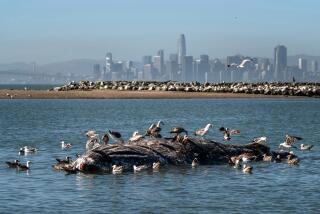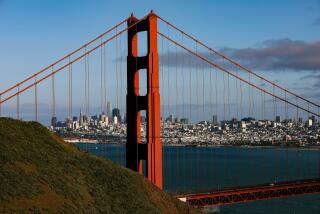Crews Contain S.F. Bay Oil Spill, Work to Save Wildlife
- Share via
MARTINEZ, Calif. — Wading through oily marsh water, dozens of oil workers and environmentalist volunteers labored Monday to mop up about 21,000 gallons of crude oil spilled into a nature habitat along upper San Francisco Bay.
Cleanup crews using dams and vacuum trucks were able to contain most of the spill, which occurred Saturday at a Shell Oil Co. refinery, to within a nearby marsh housing dozens of species of wildlife, from grebes to muskrats.
However, Coast Guard helicopter pilots reported seeing an oily sheen along 10 miles of the environmentally sensitive Suisun Bay and the Carquinez Strait, where the saltwater bay system meets a fertile freshwater delta formed by the confluence of the Sacramento and San Joaquin rivers.
Agrees to Pay
Shell has acknowledged responsibility for the accident and already has agreed to pay for the cleanup. The spill has been traced to a leaky pipe that let crude oil enter a water-drainage system leading directly into the marsh.
The Coast Guard said it could be weeks before all the viscous, smelly crude oil is completely sucked out of wetlands lining the upper bay. A state game warden said it may be years before some of the worst-hit areas can again accommodate nesting ducks and other waterfowl.
Although it is the worst oil spill in the bay since a barge leaked 28,000 gallons and killed an estimated 10,000 birds two years ago, environmentalists said the latest spill is “not a disaster for the bay as a whole.”
Bird deaths from this accident are expected to number only in the hundreds, in part because the spill occurred after most of the migrating waterfowl that use the bay wetlands already had moved north.
The spill also did not affect the two largest wetland regions of the upper bay, nor did it affect a nearby sanctuary for the salt marsh harvest mouse and other threatened or endangered species.
But the spill did occur during the nesting season of the mallard duck and several other species inhabiting the worst-hit marsh. At the International Berkeley Bird Rescue Center, where many of the injured birds were taken for cleaning and care, several oil-soaked ducks continued to lay eggs even as volunteers gathered to scrub them clean.
“A lot of these birds are nesting just now,” said Jay Holcomb, associate director of the Bird Rescue Center, “so this (spill) not only hurts them, it ruins the nests and kills their babies.”
At the Berkeley center and at the Lindsay Museum in Walnut Creek, birds and other injured wildlife--mostly muskrats and turtles--were force-fed a watery mix of high-protein dog food and vitamins and minerals, then soaked in mineral oil before being bathed as many as 10 times in water and dish-washing detergent.
Special Techniques Needed
Holcomb said some animals require special cleaning--turtles, for example, are squirted with mineral oil from a Water Pik tooth cleaner--while others, such as muskrats, often are too agitated to clean well and usually die.
About 65 birds had arrived at the Berkeley center by mid-afternoon and were penned up in fiberglass cages, crude plywood boxes--and even a closet. Field workers asked them to prepare for another 150 to 200 birds by the end of the day.
“When they come in, they’re so gummed up we can’t even tell what (species) they are,” said Joan Schimmelman, also of the Berkeley Bird Rescue Center. “We just call them ‘small,’ ‘medium’ and ‘large’ until we get enough oil off them to tell what we’re working with.”
More to Read
Sign up for Essential California
The most important California stories and recommendations in your inbox every morning.
You may occasionally receive promotional content from the Los Angeles Times.










